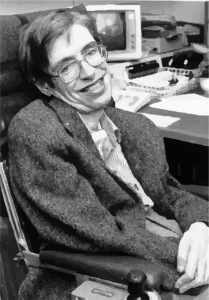By Faizaan Bhat

Born on 8 January 1942, exactly three hundred years after Galileo’s death, Stephen Hawking was a British cosmologist and director of research center that he founded, Center for Theoretical Cosmology (CTC), at the University of Cambridge. He held the chair of Lucasian Professor of Mathematics for nearly thirty years: The same was also occupied by Nobel laureate theoretical physicist Paul Dirac at the University of Cambridge.
Throughout his extraordinary career, Stephen Hawking expanded our understanding of the universe by unraveling some of its greatest mysteries. Hawking worked on gravitational singularity theorems, which demonstrated that singularity will occur in any solution to Einstein’s theory of General Relativity. He, along with Roger Penrose, published a paper in 1970 in which they were able to indicate that the universe started from a singularity, and there is a singularity at the center of black holes. After that, Hawking was made fellow at prestigious Royal Society at the age of 32: One of the youngest till date. Apart from Hawking, who writes in his autobiography -My Brief History -that the invitation took him by surprise, it shocked many senior scientists of that epoch.
After working on General Relativity, Hawking also worked on quantum field theory on curved space-time. Here the space-time was still classical, but matter fields were quantum mechanical. He was also able to demonstrate that black holes radiate a radiation. This new theory was later named after him as Hawking Radiation.

This physics of black holes were truly radical, perhaps the most radical Theoretical Physics discovery in the 2nd half of the twentieth century. They opened our eyes to the profound connections between General relativity, thermodynamics and quantum mechanics. This fairy marriage of quantum mechanics and general relativity leads to the famous information paradox. He gave a compelling, almost an airtight proof, which suggests that when black hole forms and then subsequently evaporates away completely by emitting hawking radiation, the information that goes into the black hole cannot be traced back. The Information is inevitably lost. However, the quantum mechanics insists unequivocally that information can never get totally lost.
Also read:Three pieces of advice Stephen Hawking gave to his children
Hawking didnt stop there. He worked on quantum gravity by the end of his life, and developed an interesting formalism called Euclidean Quantum Gravity. In this formalism, one arrives at a specific three dimensional geometry by summing over all four dimensional geometries that join it. Even though this did not work as he planned, it still led to many interesting results. Some of those results are still used in modern approaches to quantum gravity.
He also suggested that virtual black hole would form due to quantum fluctuations in the space-time, and they could form at any place in space. Thus, all places in space-time would be filled with a certain density of virtual black holes. He tried to analyze many consequences of this model to explain the decay of a proton. And this model has been used in particle physics ever since.
Hawking had a rare slow-progressing form of motor neuron disease, which gradually paralyzed him at the age of 21. But despite being paralyzed for 55 years of his life, he made fundamental contribution to our understanding of universe, particularly to the subject of black hole physics.

Not only this, Hawking also a great science popular having written so many books: A brief history of time, Grand Design, and Black Holes and Baby Universes among others. In spite of remaining engrossed in doing science throughout his life, Hawking never remained apolitical about the world order. He always took moral stand whenever situation demanded so. In 2013, he boycotted a conference in Jerusalem where Shimon Peres, the late Israeli president was honoured. Hawking did this because he was critical of the formation of the State of Israel. He was also a staunch supporter of BDS moment.
An anti-capitalist, Hawking spoke and advocated for many issues like global climate change, Artificial intelligence, and space colonies. He was a scientist with concern for people irrespective of their religion, creed, caste and colour. For his contribution to fundamental physics, he was awarded the prestigious Fundamental Prize in the year 2012. He passed away on 15 March 2015. His legacy can be paraphrased in the words of Nobel Prize winning physicist Krip Throne, “Newton gave us answers. Hawking gave us questions.”
Author can be reached at bhatfaizan10@gmail.com

